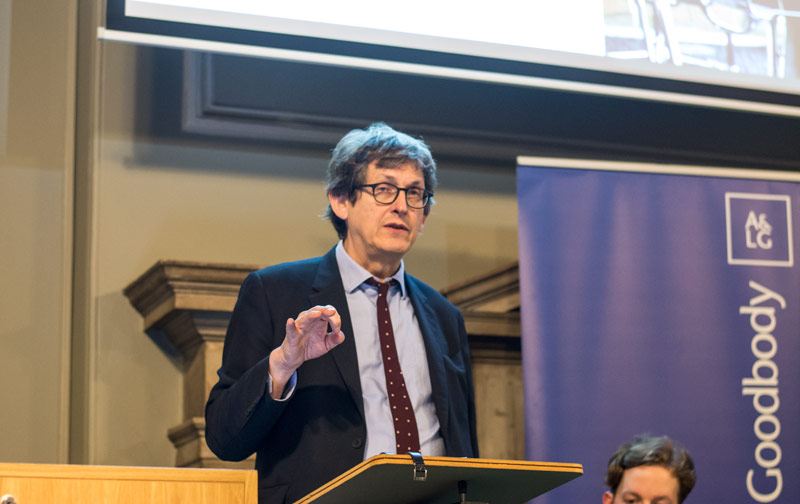
Former editor of the Guardian, Alan Rusbridger, spoke to TCD Law Society this evening on the paper’s coverage of the Snowden leaks, their role in environmental activism and the industry’s ever-increasing reliance on social media.
Rusbridger stepped down Editor of the Guardian in May 2015, having served in the position since 1995. He steered the paper through one of the most uncertain periods in journalism’s history, taking it from a print-only paper, to the launch of its website, one of the first newspaper websites in the world, in 1999, to it’s current status as one of the world’s most-read news websites.
The increasing importance of online media, and its effects on journalism, were a running thread throughout his talk, and in the questions from both the audience and the Auditor of the Law Society, Kean Kavanagh, that followed. In discussions of how the Guardian has not introduced a paywall, unlike other international competitors such as the New York Times or the Times of London, he spoke of how, rather than seeing it as “paid vs unpaid” he saw it as “closed vs open”. Ultimately, he said, those who were choosing “closed” were acting in opposition to the nature of online content, and that he believes, ultimately, that those who choose “open” will be more successful. “I don’t think the Times [of London] is making any more money than we are”, he stated.
This being the Law Society, Rusbridger opened his talk with a speech about media law, and how the law can serve to both to aid and to harm the aims of journalists as “either something that can suppress what journalism is doing or help it – and there’s no in between”.
In August 2013, Rusbridger decided to destroy the hard drives that contained information leaked by Edward Snowden, rather than comply with an order to hand them to the UK government. The information revealed the widespread surveillance of both US and international citizens by the US government’s National Security Agency. For Rusbridger, the nature of a modern newsroom, where the information could be stored all over the world rather than in a single copy, the publication of the story could be done “just as easily” from New York as in London. This idea of a global newsroom meant that the Guardian could publish from the US, there the First Amendment provides the “best protection for journalism in the world”, when under pressure from the UK government.
Rusbridger called the story the “most severe test of journalism”, one that dealt with the “intersection between free speech and national security”. On his involvement in deciding how to handle the material, he stated that the decision was “the most complex I’ve ever been involved in”. For Rusbridger, the reaction to the story, both from the public and from governments, had “vindicated” its publication. The story also won the newspaper, as well as the Washington Post, the Pulitzer Prize for public service in April 2014. He argued that the next generation of lawyers would have to keep these principles of free speech alive, as these battles are not won “for all time”.
The information they published, said Rusbridger, informed citizens by giving them vital information about how their governments were treating them, allowing them to open up the debate in earnest around surveillance: “maybe people don’t care, but the Snowden case was about him saying ‘you should know, and if you don’t care, that’s fine, but you should know.’”
On the Guardian‘s role in creating social change, Rusbridger said that, as he decided to leave the paper he realised they had not done “enough” about climate change, and that they needed to argue that the issue was also a political and economic one. The paper launched its “Keep it in the Ground” campaign in March 2015, urging corporations to divest from fossil fuels.
When asked if he had any advice for young journalists, Rusbridger said that the growth of online media meant that many young people had a competitive advantage and could find their own path: “You could go out and seek a job in RTE or the Irish Times, or you could do something that disrupts them”.
Correction: 16 December, 2015
An earlier version of this article incorrectly contextualised a quote from Rusbridger, suggesting he was comparing the money that the Guardian makes to that of the New York Times. In fact, he was comparing it to that of the Times of London.






